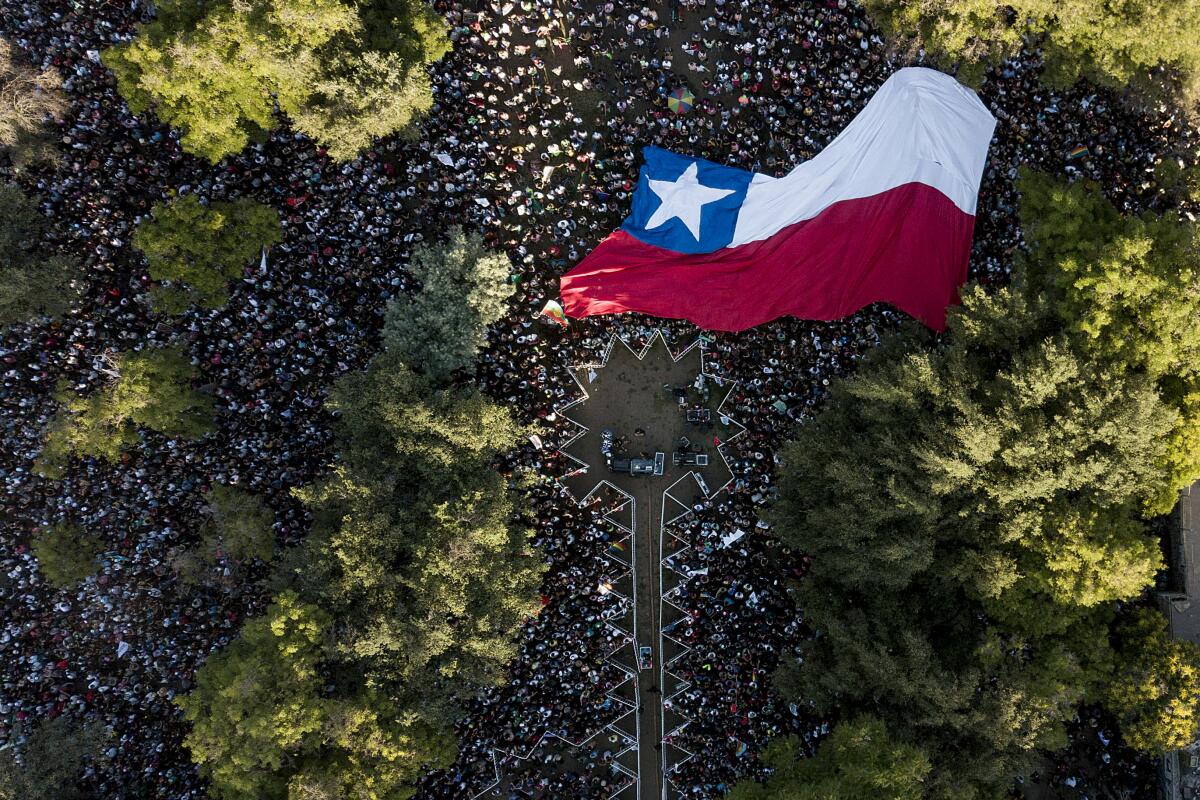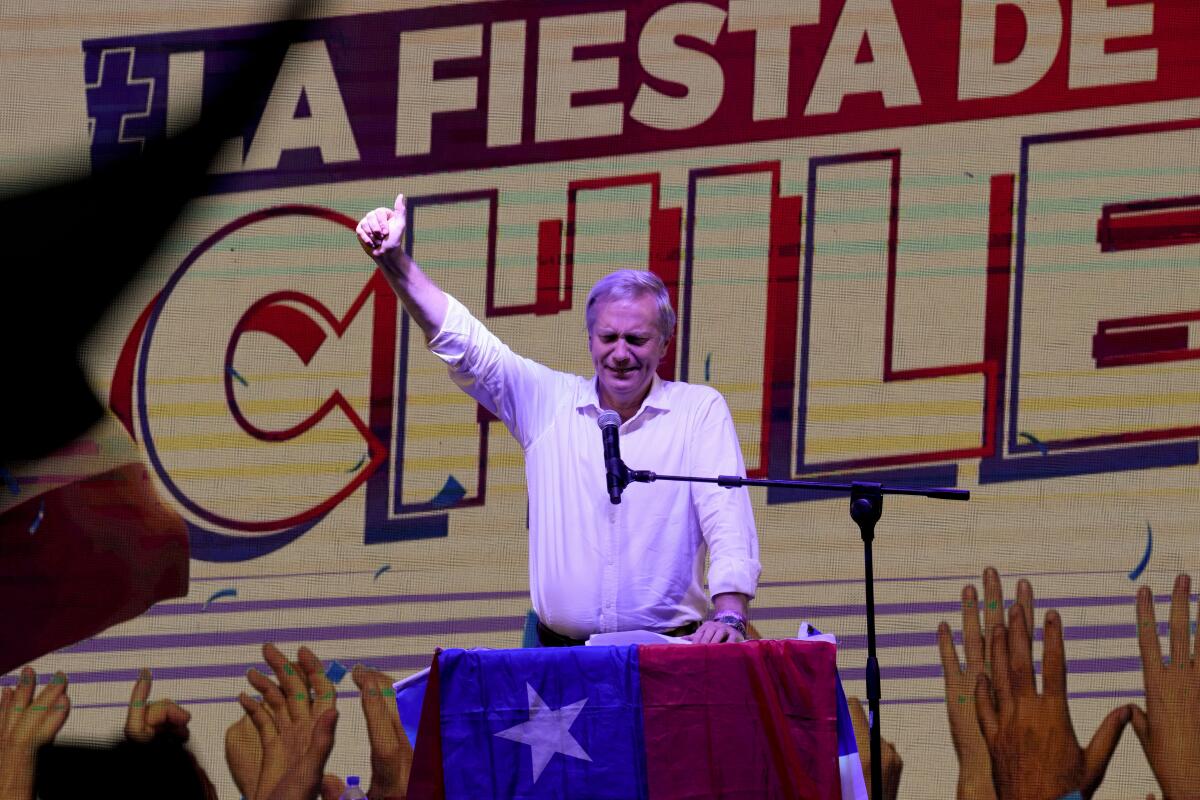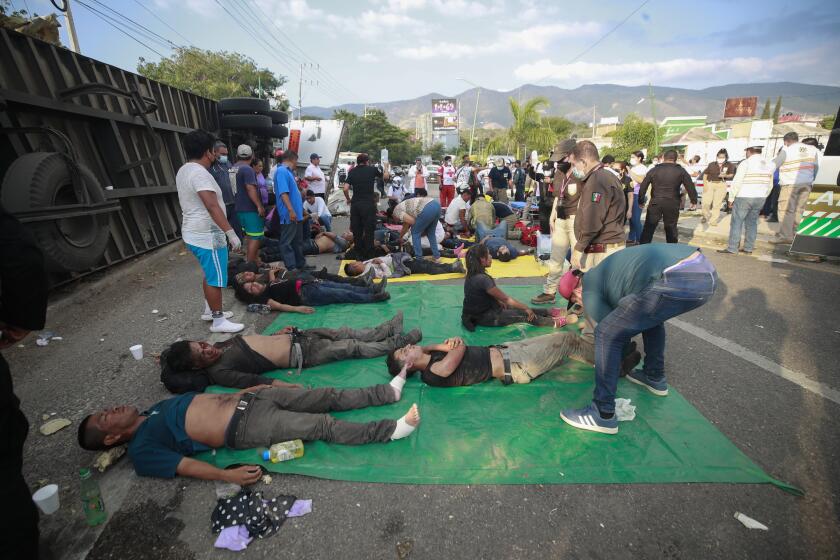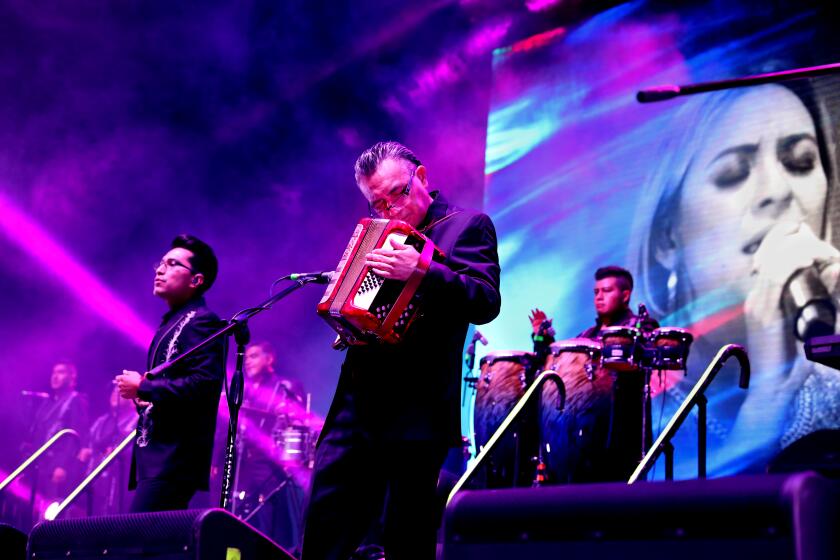Chileans going to polls to elect president in polarized election

- Share via
SANTIAGO, Chile — In one corner stands a millennial progressive who burst into prominence a decade ago as a shaggy-haired student protest leader.
In the other, a far-right career politician who is an unabashed fan of the country’s former military dictatorship.
Chileans go to the polls Sunday to elect a new president in the most polarized election here since the South American nation returned to democracy more than 30 years ago.
The runoff vote features two antagonistic alternatives — the leftist former student activist allied with the Communist Party and the ultraconservative free marketeer who reminds many of former President Trump and his South American devotee, Brazilian President Jair Bolsonaro.
Narrowing polls suggest the race could be a toss-up between José Antonio Kast, 55, of the hard-right Republican Party, which he founded, and Gabriel Boric, 35, a congressman running under the banner of the leftist I Approve Dignity coalition.
Kast is a practicing Roman Catholic and married father of nine. He has denied reports that his late father — who immigrated to Chile from Germany after World War II and launched a successful sausage business — was a practicing Nazi, saying that he was a foot soldier drafted into the Wehrmacht.
The new government-appointed boss disparages his research center as neoliberal. Students and faculty take offense.
Boric, who descends from Croatian immigrants, is single and agnostic. If elected, he would be Chile’s youngest-ever president.
The election dramatizes ongoing political upheaval in Latin America, where COVID-19 has battered economies, souring many on traditional leadership. Left-wing presidents have come to power since last year in two of Chile’s neighbors, Peru and Bolivia, and a center-left government has led adjoining Argentina since 2019.
Crucial presidential elections scheduled for next year in South America’s most populous nations — Brazil and Colombia — are also likely to showcase ideological adversaries of the left and right.

In Chile, Kast narrowly finished first and Boric second in fragmented first-round voting last month that saw no one garner a majority, leading to Sunday’s runoff vote.
Both candidates represent a stunning rebuke of the centrist left and right parties that have alternated governing Chile since 1990, following the 17-year military rule of the late Gen. Augusto Pinochet.
Since emerging from Pinochet’s dictatorship, Chile — the world’s leading copper producer and a dependable U.S. ally — has been widely viewed as a wealthy bastion of stability and economic progress in a volatile region. However, mass street protests in 2019 exposed deep divisions in the nation of 19 million where, amid considerable wealth, half of workers earn about $500 a month. Opposition to a transit fare hike quickly expanded into a nationwide mobilization against inequality.
Migrants traversing Mexico have long suffered unspeakable abuses. The perpetrators have rarely been brought to justice.
Kast, a former congressman who admires Pinochet’s former rule, has run on a socially conservative, anti-immigrant and tax-cutting agenda reminiscent of Trump. His law-and-order pronouncements have appealed to many still irate about the 2019 unrest, which left at least 31 people dead, paralyzed the country for months and resulted in torched shopping malls, supermarkets and subway stations.
“Some say I am extreme,” Kast said this month in a campaign video. “Extreme in what? In loving Chile, loving the homeland, defending the family, fighting narco-terrorism and crime, and protecting our borders from illegal immigration?”
An influx of impoverished migrants, many from Venezuela and Haiti, has become an incendiary topic, in some ways reflecting the contentious debate in the United States. Kast has backed digging a ditch along the porous frontier between Chile and Bolivia.
By contrast, Boric has eschewed immigrant-bashing and pledged to raise taxes on the rich and on corporations, to deprivatize pensions and healthcare and bolster public education.
Boric has repeatedly denounced “neoliberalism,” the conservative free-market strategy pioneered by the so-called Chicago Boys — influential Chilean economists trained at the University of Chicago.
“If Chile was the cradle of neoliberalism, it will also be its grave!” declared Boric.
Los Ángeles Azules have been making music for four decades. The Mexican band’s songs bring people together.
Since last month’s vote, the campaign has seen both candidates temper their rhetoric in a clear bid to appeal to middle-ground voters.
If elected, Boric has vowed a “gradual” implementation of his controversial plans to nationalize the pension and health systems, raise the minimum wage to $600 a month (from $400) and reduce the workweek from 45 to 40 hours. He has also backed off from a proposal to dissolve the national police force, known as the carabineros, instead calling for reforms.
“A country is not built overnight,” Boric said this month.
Kast, who drew fire for proposals to bolster aid only for families headed by married couples, has since said eligibility would be extended to all families. He also shelved a bid to eliminate Chile’s Ministry of Women — a Cabinet-level agency that oversees policies on gender violence and other issues — and reversed an earlier commitment to back the construction of coal-fired energy plants.
“The two candidates have tried to conquer the center, but it is not in their DNA,” said Andrés Salvatierra, a 42-year-old computer engineer who calls himself a moderate but reluctantly plans to vote for Kast because of his stance on law and order.
Like many other Chileans, Salvatierra worries that the postelection scenario could degenerate into a reprise of the street mayhem of 2019, especially if Kast is elected.
“If people come out to demonstrate after Sunday’s election, hopefully, it will be peacefully,” Salvatierra said. “And if Boric wins, I hope it goes well for him. I will still have to get up to work.”
Times staff writer McDonnell reported from Mexico City and special correspondent Poblete from Santiago.
More to Read
Sign up for Essential California
The most important California stories and recommendations in your inbox every morning.
You may occasionally receive promotional content from the Los Angeles Times.













